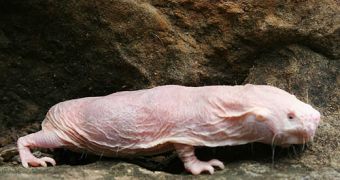Researchers working with the University of Rochester believe they have finally figured out why it is that naked mole rats have never been documented to get cancer.
They say that a special chemical found inside these animals' bodies makes them cancer-proof, and that their pinning down this chemical could one day make it possible for specialists to roll out better treatment options for human patients suffering with this condition.
The official website for the University of Rochester explains that the average naked mole rat lives for about 30 years.
Despite this impressive lifespan, no mole rat has ever been known to develop cancer and eventually die of it.
“The naked mole rat (Heterocephalus glaber) displays exceptional longevity, with a maximum lifespan exceeding 30 years.”
“In addition to their longevity, naked mole rats show an unusual resistance to cancer. Multi-year observations of large naked mole-rat colonies did not detect a single incidence of cancer,” the researcher write in their paper in the journal Nature.
By the looks of it, this is because that the tissues that make up their body are particularly rich in HMW-HA (i.e. high molecular weight hyaluronan).
The University of Rochester specialists maintain that this chemical compound, whose production is triggered by a gene named HAS2, is what keeps naked mole rats free from cancer.
They confirmed their hypothesis by depleting several naked mole rats' tissues of HMW-HA, and then waiting to see what would happen.
As they suspected, the animals became susceptible to developing tumors.
What is interesting is that, apart from producing noteworthy amounts of HMW-Ha, naked mole rats also take longer to dispose of this chemical compound.
Therefore, the chemical starts to build up in their tissues.
Lead researchers Andrei Seluanov and Vera Gorbunova now plan to carry out a series of experiments on mice, and are confident that at some point in the future their findings will benefit human patients.
“There's indirect evidence that HMW-HA would work in people.”
“It's used in anti-wrinkle injections and to relieve pain from arthritis in knee joints, without any adverse effects. Our hope is that it can also induce an anti-cancer response,” Andrei Seluanov said.

 14 DAY TRIAL //
14 DAY TRIAL //